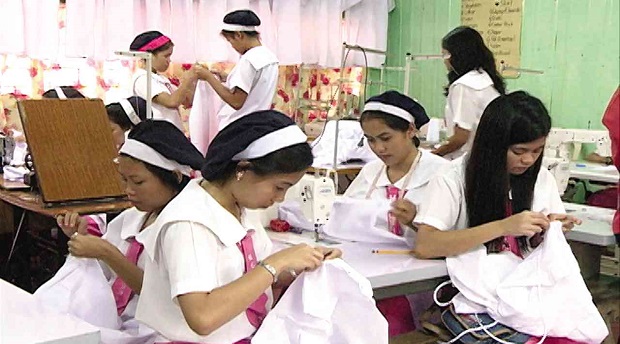
FOURTH year students of Mandaue City Comprehensive National High School are busy sewing their own graduation robes, which they will wear on graduation day this April 3. CONTRIBUTED PHOTO
CEBU CITY, Philippines—When Suzzane Tabalda walks onstage to receive her high school diploma on April 3, she will wear a toga and a cap that look like any other toga and cap except for one difference—she made them.
“Graduation will be memorable for me since I will be wearing the robe and cap that are all products of my hard work,” she said.
Tabalda is among only 51 students of a graduating class of 600 from Mandaue City Comprehensive National High School who have finished a garment workshop for their technical-vocational education program.
The program of the Department of Education aims to equip high school students with skills that may help them find jobs later.
Other students learned cooking, while most of the male students attended an automotive workshop.
Last month, the teachers required the students to sew their own graduation robes and caps in preparation for their commencement exercises in April. This will spare parents, who are mostly poor, the burden of shouldering the cost of renting the attire for as much as P300 for just a few hours.
The students didn’t even have to buy the materials since the school provided these. They only had to make a pattern and sew.
The school has six high-speed sewing machines, but only four are in working condition, and nine manual sewing machines, but only four can be used. All of the machines were donated by the city government and private companies.
“We really wish to have more machines because the students need to take turns in using these. It takes a lot of time, and we can produce only a few,” said Carmelita Montebon, teacher in charge of the workshop. With more machines, she said, the students could double production.
Tabalda said she and the other students were taught how to make patterns in their second year and how to sew garments in classes held Tuesdays and Thursdays in morning or afternoon shifts.
Montebon said the students could wear the togas and caps they had produced but had to return these to the school after graduation because these would be rented out at a minimal cost. At present, the school has more than 100 sets of graduation togas and caps, all made by students since 2012.

